中西委婉语透视不同的社会文化
英汉委婉语的社会文化透视

英汉委婉语的社会文化透视
社会中的委婉语可以帮助人们避开不必要的冲突,并保持良好的人际关系。
它的使用受到文化的影响,同时也可以反映文化的差异。
例如,西方国家的人们会使用“请客”或“下次再约”来表达想要拒绝别人的意思,而在中国文化中,人们更倾向于直接否定某人的请求,以表达拒绝的意思。
另外,委婉语在不同地区也会有所不同,比如在美国人中,人们会使用“我觉得”、“我的想法是”来表达自己的想法,而在英国人中,人们会使用“我想”,以表达自己的观点。
总之,通过观察委婉语的使用情况可以得出的结论是,不同的文化中的人们有不同的习惯和传统,这些差异也体现在他们使用的语言中。
因此,能够理解和适应这种差异,有助于人们之间建立良好的交流沟通。
此外,委婉语的使用还受到性别的影响。
在西方社会,男性和女性会使用不同的委婉语表达方式。
例如,男性会更加直接地说出自己的想法,而女性则会采取更加委婉的方式表达。
因此,在交流中,应该尊重不同性别的差异,以确保有效的沟通。
此外,委婉语的使用也受到社会的影响。
不同的社会群体在语言使用上也有差异,例如社会地位较高的人会使用更多的委婉语。
因此,在社会交往中,我们也要注意避免不恰当的语言使用,以免在语言上造成不必要的误会。
最后,在语言交流中使用委婉语,不仅有利于建立良好的人际关系,而且也有助于保护彼此的情感。
使用委婉语可以显示出一种更礼貌,更友好的态度,表达出彼此之间的尊重和理解,从而使交流更加有效。
最终,使用适当的委婉语能够帮助人们更好地建立友好社会关系和深入交流。
从英汉委婉语对比看中西方文化_陈彦彦

从英汉委婉语对比看中西方文化
◎陈彦彦
(安徽大学外语学院 安徽・合肥 230039)
摘 要 委婉语作为人类交流语言的组成部分,是世界各种语言中的普遍现象。 同时委婉语也是一种文化现象。英汉两 种语言都有大量委婉语, 它们既有同又有异。 本文通过分析比较英汉委婉语的差异,揭示出揭示了这一语言现象中所蕴含 的深厚文化内涵。 对委婉语的研究有助于提高英语学习者的文化意识和跨文化交际能力,为成功进行跨文化交际铺平道路。 关键词 语言 委婉语 文化差异 跨文化交际
英语 Euphemism (委婉语 ) 一词源于希腊语, 即 good, 创造了许多词类委婉语, the advancing age (年长者) , 如 eu the
162
2007 年第
12 期
安徽文学
说 文 解 字
(指棺木的长与高,借指棺材) 来避讳 “死” 。这些语言上的表 现深受各自文化的影响: 对英语国家文化产生深远影响的宗 教主要是基督教。 基督教认为, 人是上帝创造的, 人类也要爱 上帝, 才能赎清原罪, 进入天堂。在英语中, 源于宗教的死亡 委婉语本意都是 “应上帝之召” 上天堂” 如:to answer the 、 “ 等, final summons(接受最后的召唤 ), depart to God(去见上帝) to 等。 而相反, 中国文化则受佛教、 道教影响深远。 佛教传入中 国后, 经过长期的流传、 渗透, 对中国的传统文化产生了很大 的影响。源自佛教的死亡委婉语有 “涅磐、 圆寂、 归寂、 归真” 等。 (当然,这种委婉语只适用于僧尼之死)。道教是中国本 土产生的宗教。道教把先秦道家的理论概念“道”加以神秘 化, 作为根本的信仰, 把得道成仙作为追求的最高境界。 道教 源自道教的死亡委婉语有 “升天、 跨鹤、 仙游、 仙逝” 等。这类 源于道教的委婉语反映了人们希望通过自身努力去超越死 亡, 寻找生命寄托这种自强不息的乐观进取心态。 (三) 关于人体功能 在人体的某些功能方面, 世界各民族历来对人体排出的 各种气味和污物,往往是持厌恶避讳的态度, 常常避免使用粗 俗、 不礼貌的语言, 这方面的委婉语在英语和汉语中都非常丰 富。如果来了例假 menstruation , 需要请假休息, 可以这样委 婉表达 I have got the flags out or I am having my periods.需要 do one’ business , s cash a check , spend a penny , Johnny see 等, 此外还有 bath room ,comfort station,halfway house , old soldier’ home ,the wash-room, s water close (W. C) 等许多称 法。汉语中也有 “净手,去方便,更衣,起夜,去去就来, 蹲点” 等 表示法。 (四) 关于职业生活 委婉语的使用, 能够提高某些职业或行当的级别。其中 有一种较常见的倾向, 就是让这种名称听上去很有点专业味 道。 如有些职业或工作不再叫 jobs(指一般性工作 ) , 而称 professions (多指从事脑力劳动或受过专门训练的职业) 。某些 第三产业的工作者对职业的社会地位十分敏感。 有些需要借 助委婉的语义扬升以取得心理平衡。 Engineer 也是个叫得响 的词儿, 于是一大批从事各种行业的人都给他们的工种冠上 了 engineer : footwear maintenance engineer 其实是以擦皮鞋 为生 (bootblack) ; recreation engineer 是城市清洁工 ( sanitary 这类 engineer 的合成词竟有不下二千种。医务 man) 据统计, 专业在社会上颇受尊敬, 因此有不少委婉语就摹仿医师(phys如:在美容院工作的人, 尤其是为顾客做头 ician) 的词形而成, 发的人(hairdresser) 被称做 beautician。英汉语在职业方面委 婉语的使用比较相近。 谈及性自由、 性行为不检点时, 英语中 委婉语的词义模糊且多为中性化, love companion , 如 mixed “性” 并善谈 , “性” 有关 , “性” 行为、 性 singles 等。英美人敢谈
从委婉语的使用看中西文化差异

."& @*&$% !?; 5/ .:; 4*$%;/ :;/>; ! ?; 5/ =4* .* :;,6;/! ?; @5.: A*82 4* .* <"".=B*5/ */; "- C,D)&2 4* .* */)"- $,-.! 4*=(,-- .* */)"- &)@,&8 等 (
汉语中 & 死亡 ’ 的委婉语多来自道教和佛教 $ 道教是中国的本土宗教 $ 源自老子和庄子的 道家思想 $ 集中论述道教生死观的是庄子 $ 庄子曰 )& 方生方死 $ 方死方生 ’$ 认为生死本是持续 一体的 $人应顺从命运 ( 因此庄子主张清净无为 $甚至对丧葬也持一种顺应自然的态度 ( 他说 ) & 吾以天地为棺椁 ’$ 这种达观 ! 淡泊的生死观在道教死亡的委婉语中得以充分体现 $ 如 & 隐化 ! 迁形 !物化 !遁化 !羽化 ! 气散 !归道山 ’等 $ 长生成仙是道教追求的终极目标 $ 为此道教徒有一系 列修炼方术 $ 道教的神仙观念在民间也有深厚的土壤 $ 许多人也竞相崇拜仙人 ! 炼丹服药以求 长生不老 ( 道教的这种神仙学说给后世留下了 &化仙 $升天 $升仙 $仙逝 $驾鹤西游 ’等委婉语 ( 佛 教发源于印度 $后传入中国 ( 佛教认为一切有生命的东西都依据一定的因果关系 $在 &六道 ’*即 天 +人 !阿修罗 ! 饿鬼 ! 畜生 ! 地狱 , 中轮回 $ 历经苦难 $ 生死相续 $ 只有皈依佛门 $ 才能摆脱轮回之 苦 $进入佛教修行的最高境界 ( 来自佛教的委婉语有 &成佛 $圆寂 $归真 $坐化 $寂灭 ’等 (
第 A" 卷 AGGH 年 I 月
对中西委婉语跨文化现象进行的对比研究
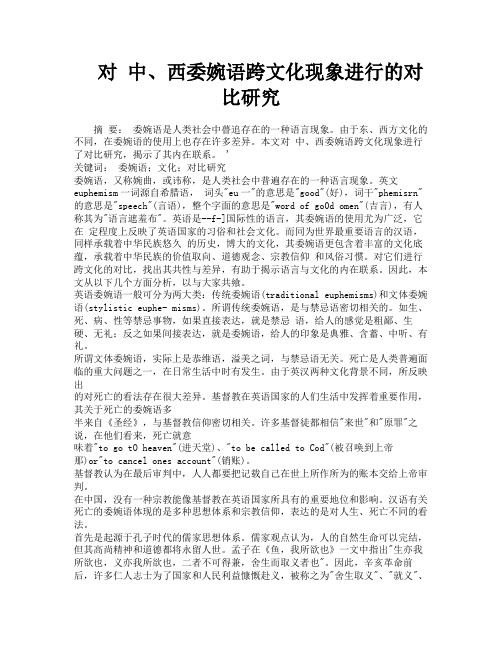
对中、西委婉语跨文化现象进行的对比研究摘要:委婉语是人类社会中瞢追存在的一种语言现象。
由于东、西方文化的不同,在委婉语的使用上也存在许多差异。
本文对中、西委婉语跨文化现象进行了对比研究,揭示了其内在联系。
'关键词:委婉语;文化;对比研究委婉语,又称婉曲,或讳称,是人类社会中普遍存在的一种语言现象。
英文euphemism一词源自希腊语,词头"eu一"的意思是"good"(好),词干"phemisrn"的意思是"speech"(言语),整个字面的意思是"word of go0d omen"(吉言),有人称其为"语言遮羞布"。
英语是--f-]国际性的语言,其委婉语的使用尤为广泛,它在定程度上反映了英语国家的习俗和社会文化。
而同为世界最重要语言的汉语,同样承载着中华民族悠久的历史,博大的文化,其委婉语更包含着丰富的文化底蕴,承载着中华民族的价值取向、道德观念、宗教信仰和风俗习惯。
对它们进行跨文化的对比,找出其共性与差异,有助于揭示语言与文化的内在联系。
因此,本文从以下几个方面分析,以与大家共飨。
英语委婉语一般可分为两大类:传统委婉语(traditional euphemisms)和文体委婉语(stylistic euphe- misms)。
所谓传统委婉语,是与禁忌语密切相关的。
如生、死、病、性等禁忌事物,如果直接表达,就是禁忌语,给人的感觉是粗鄙、生硬、无礼;反之如果间接表达,就是委婉语,给人的印象是典雅、含蓄、中听、有礼。
所谓文体委婉语,实际上是恭维语,溢美之词,与禁忌语无关。
死亡是人类普遍面临的重大问题之一,在日常生活中时有发生。
由于英汉两种文化背景不同,所反映出的对死亡的看法存在很大差异。
基督教在英语国家的人们生活中发挥着重要作用,其关于死亡的委婉语多半来自《圣经》,与基督教信仰密切相关。
从文化的不同层面对比中西委婉语
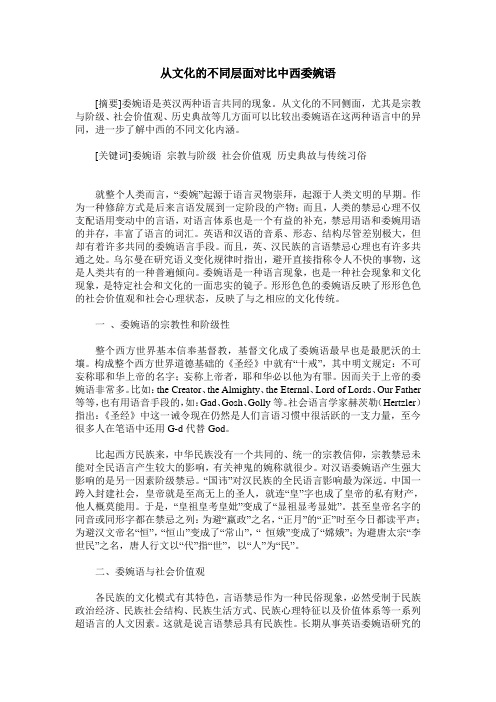
从文化的不同层面对比中西委婉语[摘要]委婉语是英汉两种语言共同的现象。
从文化的不同侧面,尤其是宗教与阶级、社会价值观、历史典故等几方面可以比较出委婉语在这两种语言中的异同,进一步了解中西的不同文化内涵。
[关键词]委婉语宗教与阶级社会价值观历史典故与传统习俗就整个人类而言,“委婉”起源于语言灵物崇拜,起源于人类文明的早期。
作为一种修辞方式是后来言语发展到一定阶段的产物;而且,人类的禁忌心理不仅支配语用变动中的言语,对语言体系也是一个有益的补充,禁忌用语和委婉用语的并存,丰富了语言的词汇。
英语和汉语的音系、形态、结构尽管差别极大,但却有着许多共同的委婉语言手段。
而且,英、汉民族的言语禁忌心理也有许多共通之处。
乌尔曼在研究语义变化规律时指出,避开直接指称令人不快的事物,这是人类共有的一种普遍倾向。
委婉语是一种语言现象,也是一种社会现象和文化现象,是特定社会和文化的一面忠实的镜子。
形形色色的委婉语反映了形形色色的社会价值观和社会心理状态,反映了与之相应的文化传统。
一、委婉语的宗教性和阶级性整个西方世界基本信奉基督教,基督文化成了委婉语最早也是最肥沃的土壤。
构成整个西方世界道德基础的《圣经》中就有“十戒”,其中明文规定:不可妄称耶和华上帝的名字;妄称上帝者,耶和华必以他为有罪。
因而关于上帝的委婉语非常多。
比如:the Creator、the Almighty、the Eternal、Lord of Lords、Our Father 等等,也有用语音手段的,如:Gad、Gosh、Golly等。
社会语言学家赫茨勒(Hertzler)指出:《圣经》中这一诫令现在仍然是人们言语习惯中很活跃的一支力量,至今很多人在笔语中还用G-d代替God。
比起西方民族来,中华民族没有一个共同的、统一的宗教信仰,宗教禁忌未能对全民语言产生较大的影响,有关神鬼的婉称就很少。
对汉语委婉语产生强大影响的是另一因素阶级禁忌。
“国讳”对汉民族的全民语言影响最为深远。
从英汉委婉语对比中透析中西文化差异

从英汉委婉语对比中透析中西文化差异委婉语其实是一种修辞方法,被广泛的应用在英汉的语言当中,并且在英汉语言中占据着非常重要的地位。
但是由于英汉委婉语的用法和使用场景不同,所以通过对比就可以了解到中西文化的差异。
本文通过委婉语的概念和英汉委婉语产生的因素进行了分析和探讨,总结归纳出了中西文化的具体差异,以供相关人员参考或研究。
标签:英汉委婉语;中西文化差异;对比前言:委婉语产生在特定的语言环境中,委婉语的使用也需要在特定的环境中。
也就是说委婉语是为了使语言更加流畅,从而出现的一种特殊语言形式。
但是由于不同国家文化差异,所以在委婉语的使用上也大不相同,根本原因就是委婉语产生的因素就是心理因素,所以中西方国家对于委婉语的使用时不同的。
总的来说,通过英汉委婉语的对比,就能够看出中西方的文化差异。
一、委婉语的概念委婉语其实是一种修辞方法,被广泛的应用在英汉的语言当中,并且在英汉语言中占据着非常重要的地位。
委婉语产生在特定的语言环境中,委婉语的使用也需要在特定的环境中。
委婉语表达的方式主要有含蓄、委婉、禁忌等特点,委婉语的主要作用就是能够使语言更加的顺畅和流利,但是由于中西方的文化差异,所以在委婉语的使用上也大不相同,根本原因就是委婉语产生的因素就是心理因素,所以中西方国家对于委婉语的使用时不同的。
委婉语总的来说可以的心理因素主要可以分为:避讳心理、掩饰心理和礼貌心理〔1〕。
二、英汉委婉语产生的因素(一)避讳心理委婉语的形成其实就是在现如今社会的发展过程中,对于一些避讳性的东西所使用的语言,也可以叫做禁忌心理,一般情况下都是对于人心理上恐惧或者避讳的东西所使用的语言。
在最早的时候,委婉语主要都是应用在妖鬼神魔等神秘又可怕的事物上,但是随着社会的不断发展和进步,委婉语已经被逐渐应用在死亡、性、重大疾病等生理或者心理缺陷中。
在日常生活中,如果将此类食物通过直接的语言进行表达,会给他人一种不礼貌、粗鄙的印象,并且有一些语言直接通过语言进行表达也会让人比较难以启齿,所以人们在表达这些事物的时候一般都采用委婉语来进行表达,使表达的更加清楚又不会给人一种没礼貌、没素质的印象。
委婉语与中西文化差异

oe cuttb nt oe coB ( n’a on eet n’acut上交 E己的 账本 ) Sc so s o s j ,如实汇报
一
Hale Waihona Puke 生的所作所 为,听候上帝的tel tu g n ( h s id met最后审判) a 在中国 ,对于占主流地 位的汉族 文化来i 佛教 和道教的影响比 兑,
人{在 交际埘 ,为了避免直接提 及某些慨念或事物 ,避免 使川可 『 】 能引起 不怏 .不满或有拟感情 、 系的 沿言,征往采用辽 I折 的方 关 J J i 法 ,I j 吏}一些 代朋的 、模糊的或暗示性的 涮语 ,这就是委婉 沿 委婉 } 语是世界各 民族l 言-共存的一种文化现 象 沦是在英浯还 是在汉 i } } 』 .无 语中 .委婉 语的使用不仪历业非常悠久 ,i H运 用也十分广泛 委婉 语在 英语和汉 语两种语言的不I 使} ,集L 反映了中西两种文化之 『 州 } j } I H j 的差异。本文对一些较为常 见的英汉委婉语在L 西方酗家中的运 j情 } | { j 况J 以分析比较 .揭示 它们所 蕴含的 不J J u 的文化内涵。
3 由辟 l 21 3 技 Q1 期 年第
学 术 研 讨
委 婉 语 与 中 西 文 化 差 异
曾 庆 瑜
( 南大学 三亚学院 公共基础教学 分院 ) 海
从英汉委婉语对比透析中西方文化

从英汉委婉语对比透析中西方文化摘要:英汉两种语言由于不同的文化背景、民族思维习惯以及社会心理,在委婉语的表达上表现出很大的差异。
本文通过对英汉两种语言的委婉语进行对比,揭示出英汉委婉语在宗教信仰、社会心理以及思维习惯等方面的不同,试图给英语和汉语学习、跨文化交际以启示。
关键词:英汉委婉语;中西方文化;对比【中图分类号】g642一、引言委婉语是一种文化现象,不同民族在生活交流中,为了避免语言上的不礼貌。
从而使用婉转、含蓄的表现手法。
委婉语反映了不同民族的文化背景、思维习惯、社会心理以及中西方文化的差异。
二、委婉语的定义范畴英文euphemism一词来源于希腊语,eu- 是前缀,意思是“good”(好的),-phemism的意思是“saying speech”,合起来就是“good speech”(好听的话)。
牛津高级词典中euphemism 的定义为“an indirect word or phrase that people often use to refer to sth embarrassing or unpleasant, sometimes to make it seem more acceptable than it really is”。
汉语中与euphemism相对应的修辞格为委婉语。
英汉委婉语存在很大不同,英语是一种形合的语言,可通过单词的屈折变化来表现语言形式;而汉语作为一种重意合的语言,无词形变化,因此不用或少用单词的曲折变化来表现,而是采用一些非间接的语言表达。
以下对英汉委婉语作一对比分析。
三、委婉语的使用范畴委婉语作为一种文化现象蕴含了浓厚的社会文化。
正如德国著名语言学家威廉·冯·洪堡特所说,语言和文化、民族存在紧密的联系,任何语言都可以从中瞥见其文化的印记。
(1)有关职业的委婉语:英汉语中均存在一定数量的关于职业的委婉语。
如英语中将garbage collector(垃圾清洁工)称sanitation engineer(环卫工程师)。
禁忌语与委婉语的中西方文化特征
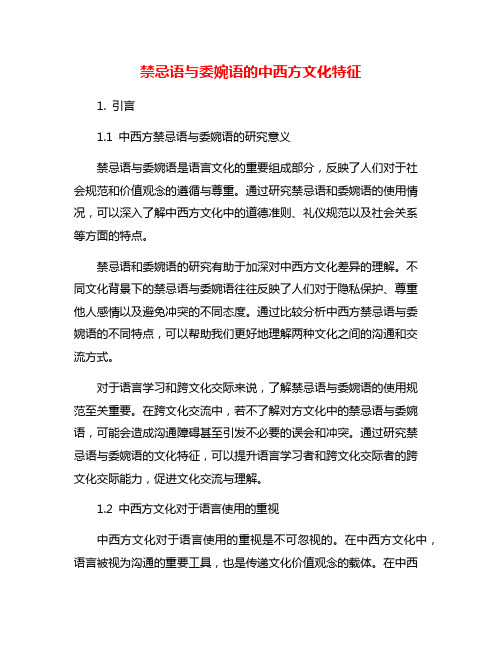
禁忌语与委婉语的中西方文化特征1. 引言1.1 中西方禁忌语与委婉语的研究意义禁忌语与委婉语是语言文化的重要组成部分,反映了人们对于社会规范和价值观念的遵循与尊重。
通过研究禁忌语和委婉语的使用情况,可以深入了解中西方文化中的道德准则、礼仪规范以及社会关系等方面的特点。
禁忌语和委婉语的研究有助于加深对中西方文化差异的理解。
不同文化背景下的禁忌语与委婉语往往反映了人们对于隐私保护、尊重他人感情以及避免冲突的不同态度。
通过比较分析中西方禁忌语与委婉语的不同特点,可以帮助我们更好地理解两种文化之间的沟通和交流方式。
对于语言学习和跨文化交际来说,了解禁忌语与委婉语的使用规范至关重要。
在跨文化交流中,若不了解对方文化中的禁忌语与委婉语,可能会造成沟通障碍甚至引发不必要的误会和冲突。
通过研究禁忌语与委婉语的文化特征,可以提升语言学习者和跨文化交际者的跨文化交际能力,促进文化交流与理解。
1.2 中西方文化对于语言使用的重视中西方文化对于语言使用的重视是不可忽视的。
在中西方文化中,语言被视为沟通的重要工具,也是传递文化价值观念的载体。
在中西方文化中,语言的使用不仅局限于传递信息,更体现了人们的社会地位、教养和文化修养。
在西方文化中,人们注重用语言表达自己的思想和情感,追求直接、坦诚的沟通方式,倡导自由开放的言论环境。
而在中国文化中,人们则更注重语言的含蓄和委婉,尽量避免直接表达冲突或者伤害他人的言辞。
中西方文化在语言使用上的差异也体现了各自文化背景和价值观念的不同。
对于中西方人来说,正确地运用语言不仅是一种礼仪,更是展示自身文化素养和修养的重要方式。
由于语言是文化的重要组成部分,对中西方文化对语言的重视和不同表现形式的研究具有重要的现实意义和学术价值。
2. 正文2.1 中西方禁忌语的定义与特点禁忌语是指在特定文化背景下具有不文明、不得体或不合适之处的语言表达。
在中西方文化中,禁忌语具有以下特点:1. 文化内涵不同:中西方文化对于禁忌语的定义存在差异。
从中西委婉语的对比透视中西文化差异论文

本科毕业论文从中西委婉语的对比透视中西文化差异Chinese and English Cultural Differences in The Comparison Between Chinese and WesternEuphemism系(院)名称:外国语系专业班级:学生姓名:指导教师姓名:指导教师职称:2012 年 5 月毕业设计(论文)原创性声明和使用授权说明原创性声明本人郑重承诺:所呈交的毕业设计(论文),是我个人在指导教师的指导下进行的研究工作及取得的成果。
尽我所知,除文中特别加以标注和致谢的地方外,不包含其他人或组织已经发表或公布过的研究成果,也不包含我为获得安阳工学院及其它教育机构的学位或学历而使用过的材料。
对本研究提供过帮助和做出过贡献的个人或集体,均已在文中作了明确的说明并表示了谢意。
作者签名:日期:指导教师签名:日期:使用授权说明本人完全了解安阳工学院关于收集、保存、使用毕业设计(论文)的规定,即:按照学校要求提交毕业设计(论文)的印刷本和电子版本;学校有权保存毕业设计(论文)的印刷本和电子版,并提供目录检索与阅览服务;学校可以采用影印、缩印、数字化或其它复制手段保存论文;在不以赢利为目的前提下,学校可以公布论文的部分或全部内容。
作者签名:日期:目录中文摘要、关键词 (Ⅰ)英文摘要、关键词 (Ⅱ)引言 (1)第1章:委婉语简介 (2)1.1委婉语的定义 (2)1.2英语委婉语 (2)1.2.1英语委婉语的分类 (2)1.2.2英语委婉语的特点 (3)1.3汉语委婉语 (5)1.3.1汉语委婉语的分类 (5)1.4委婉语的功能 (5)1.4.1避讳功能 (6)1.4.2礼貌功能 (6)1.4.3掩饰功能 (6)第2章:英汉委婉语比较 (7)2.1关于年老的委婉语 (7)2.2关于贫穷的委婉语 (8)2.3关于职业的委婉语 (9)2.4关于失业的委婉语 (9)2.5关于老(old)的差异 (9)2.7有关“死”的差异 (10)2.7.1从表达形式看 (10)2.7.2宗教文化带来的表达差异 (10)2.8关于厕所的差异 (10)2.9有关“small”的差异 (11)2.10有关于称谓委婉语的差异 (11)2.11有关伤病残方面的委婉语 (12)2.12有关犯罪方面的委婉语 (12)第3章:英汉委婉语体现中西方文化相异 (13)3.1礼仪文化差异 (13)3.2价值标准的差异 (13)3.3宗教信仰的差异 (14)3.4伦理文化的差异 (15)3.5社会制度的差异 (16)第4章:研究意义 (18)结论 (19)致谢 (20)参考文献 (21)从中西委婉语的对比透视中西文化差异摘要:委婉语是人类使用语言过程中的一种普遍现象,是人们谈论那些令人不快或尴尬的事情时所使用的较为礼貌的说法。
中英委婉语的文化解读探索
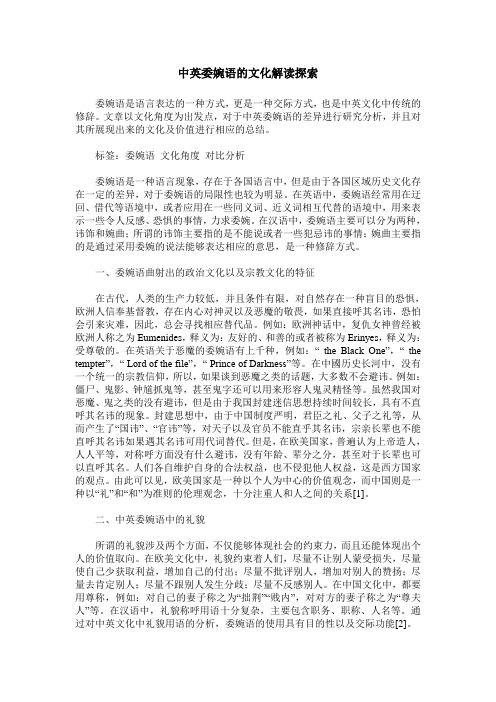
中英委婉语的文化解读探索委婉语是语言表达的一种方式,更是一种交际方式,也是中英文化中传统的修辞。
文章以文化角度为出发点,对于中英委婉语的差异进行研究分析,并且对其所展现出来的文化及价值进行相应的总结。
标签:委婉语文化角度对比分析委婉语是一种语言现象,存在于各国语言中,但是由于各国区域历史文化存在一定的差异,对于委婉语的局限性也较为明显。
在英语中,委婉语经常用在迂回、借代等语境中,或者应用在一些同义词、近义词相互代替的语境中,用来表示一些令人反感、恐惧的事情,力求委婉。
在汉语中,委婉语主要可以分为两种,讳饰和婉曲;所谓的讳饰主要指的是不能说或者一些犯忌讳的事情;婉曲主要指的是通过采用委婉的说法能够表达相应的意思,是一种修辞方式。
一、委婉语曲射出的政治文化以及宗教文化的特征在古代,人类的生产力较低,并且条件有限,对自然存在一种盲目的恐惧,欧洲人信奉基督教,存在内心对神灵以及恶魔的敬畏,如果直接呼其名讳,恐怕会引来灾难,因此,总会寻找相应替代品。
例如:欧洲神话中,复仇女神曾经被欧洲人称之为Eumenides,释义为:友好的、和善的或者被称为Erinyes,释义为:受尊敬的。
在英语关于恶魔的委婉语有上千种,例如:“ the Black One”,“ the tempter”,“ Lord of the file”,“ Prince of Darkness”等。
在中國历史长河中,没有一个统一的宗教信仰,所以,如果谈到恶魔之类的话题,大多数不会避讳。
例如:僵尸、鬼影、钟馗抓鬼等,甚至鬼字还可以用来形容人鬼灵精怪等。
虽然我国对恶魔、鬼之类的没有避讳,但是由于我国封建迷信思想持续时间较长,具有不直呼其名讳的现象。
封建思想中,由于中国制度严明,君臣之礼、父子之礼等,从而产生了“国讳”、“官讳”等,对天子以及官员不能直乎其名讳,宗亲长辈也不能直呼其名讳如果遇其名讳可用代词替代。
但是,在欧美国家,普遍认为上帝造人,人人平等,对称呼方面没有什么避讳,没有年龄、辈分之分,甚至对于长辈也可以直呼其名。
浅谈英汉委婉语折射出的文化差异

委婉语折射文化异同

委婉语折射文化异同委婉语是各种语言中的一种特殊语言现象,它是指在表达某种含义时,通过使用某些委婉的措辞来达到避免冒犯或尊重他人的目的。
因此,委婉语不仅是一种语言形式,也是一种社交文化现象。
在不同文化背景下,委婉语的使用也存在着差异,反映出了各自文化观念之间的异同。
本文将从语言、文化等多个角度探讨委婉语折射文化异同的问题。
一、语言角度语言是文化的载体,委婉语也不例外。
各种委婉语往往都载有各自文化的价值观念,如礼仪、尊严、敬意等等。
以中英文委婉语为例,中文委婉语注重礼仪、尊重长辈、避免冲突,如“请问您贵姓?”、“不敢当”、“您太客气了”、“小声说”等等;而英文委婉语注重敬意、礼貌客套、表达谦虚,例如“How do you do?”、“Excuse me, could you。
”、“I'm afraid。
”、“Would you be so kind as to。
”等等。
这些委婉语不仅可以减轻语言交际中的紧张氛围,更能反映出各自文化中的特有文化价值观。
因此,语言角度上的委婉语折射了文化差异。
二、文化角度委婉语和文化密不可分。
在不同文化中,一种语言形式会因为不同的文化背景而有着不同的诠释和使用,且其形式和用途也多种多样。
比如,印度社会注重神圣和敬意,所以委婉语的使用是广泛的,如“pranam”表示“你好”、“mithaai”表示“糖果”等等;而在日本,委婉语作为一种社交礼仪而存在,如“otsukaresama desu”表示“辛苦了(工作辛苦了)”、“moushiwake arimasenga”表示“对不起”等等。
这些委婉语反映了各自文化中的价值观、道德和礼仪规范,因此,文化角度上的委婉语也是一种文化符号。
三、社会角度社会也是委婉语的重要背景。
在某些社会中,委婉语被广泛应用于日常交往之中,例如中国、日本、印度等东方国家。
这些国家社会注重礼貌、敬意、尊严等等,因此委婉语被广泛地应用于日常生活中。
另一方面,在一些西方国家,人们注重实用、直接和简明扼要,因此委婉语的使用相对较少。
从禁忌语与委婉语看中西文化的差异【lunwen+开题+综述】
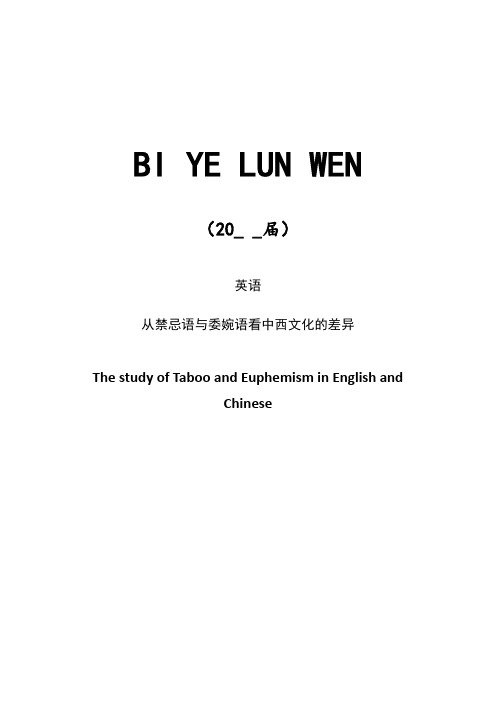
BI YE LUN WEN(20_ _届)英语从禁忌语与委婉语看中西文化的差异The study of Taboo and Euphemism in English andChinese摘要语言和文化是一种辩证的关系,每种语言都是其文化的一部分,语言既服务于文化又反映着文化的需要。
委婉语与禁忌语是人们使用语言的重要形式,在人际交往中起着重要的作用。
委婉语与禁忌语随着文明的发展,沉淀了丰富的文化内涵。
语言是社会发展的产物,同时也就反映了社会生活,随着历史的进步的发展,语言也发生了很多的变化。
由于宗教、迷信、礼仪以及科技不发达的原因,某些语言就被禁止使用,同是也就出现了用另外的语言来替代这种语言的现象,于是就出现了委婉语与禁忌语。
在不同的民族和文化中都存在着委婉语与禁忌语,如果我们掌握了他们,就能够在日常生活特别是在跨文化交际中,提高我们的交际能力。
本文通过介绍委婉语与禁忌语的定义、形成方式、各自的在不同文化中的特点、以及委婉语与禁忌语在中西方文化上的宗教、等级观念、礼仪等方面的具体比较来更好的分析委婉语与禁忌语,便于了解不同的文化,这样就能更好的掌握它们,并运用到实际当中,提高交际能力,避免不必要的误会。
关键词:委婉语,禁忌语,语言,文化,比较AbstractThe relation between language and culture is dialectic. Every language is a part of its culture. Language does not only serve the culture, but also is a mirror for the culture. Language is the outcome of the social development, and it also reflects the society. With the development of the history, we have seen a lot of changes about language. Taboo and Euphemism are the important forms in our society. And they also play an important role in interpersonal interaction. With the development of the civilization, Taboo and Euphemism have also affected and enriched the culture. Because of the backwardness of religions, superstitions, etiquettes, and technologies, a part of the language is not allowed to use, in the same time, some other words came up and replaced these words which are not allowed to be used. Then, Taboo and Euphemism are created in our daily life.Key words: Taboo,Euphemism,language, culture, comparisonContentsAbstract (Ⅱ)1 Introduction -------------------------------------------------------------------------------- 102 Origin and Definition of taboo and euphemism ------------------------------------ 10 2.1 Origin and Definition of taboo---------------------------------------------------------- 10 2.2 Origin and Definition of euphemism -------------------------------------------------- 112.3 sample analysis --------------------------------------------------------------------------- 113 Feature of euphemism and taboo in Chinese and English ------------------------ 12 3.1 The language features of euphemism -------------------------------------------------- 12 3.1.1 Nationality ------------------------------------------------------------------------------ 12 3.1.2 Locality ---------------------------------------------------------------------------------- 12 3.1.3 Relevance ------------------------------------------------------------------------------- 12 3.1.4 Indirection and Relativity ----------------------------------------------------------- 13 3.1.5 Fuzziness ------------------------------------------------------------------------------ 13 3.1.6 Humor --------------------------------------------------------------------------------- 133.2 The language features of taboo --------------------------------------------------- 14 3.2.1 Universality -------------------------------------------------------------------------- 143.2.2 Nationality --------------------------------------------------------------------------- 143.2.3 Relevance ---------------------------------------------------------------------------- 143.2.4 Description --------------------------------------------------------------------------- 153.2.5 Class nature -------------------------------------------------------------------------- 153.2.6 Implicitness -------------------------------------------------------------------------- 154 Three Formations of Euphemism and taboo ------------------------------------ 154.1 Formation of Taboo ------------------------------------------------------------------- 16 4.1.1 Profanities --------------------------------------------------------------------------- 164.1.2 Obscenities -------------------------------------------------------------------------- 164.1.3 Vulgarities --------------------------------------------------------------------------- 174.1.4 Sensitive topics --------------------------------------------------------------------- 174.2 Principles of the Formation of Euphemism --------------------------------------- 17 4.2.1 Remoteness ------------------------------------------------------------------------- 174.2.2 Pleasantness ------------------------------------------------------------------------ 184.2.3 Relatedness ----------------------------------------------------------------------- 185 The difference in Taboo and Euphemism between Chinese and English - 195.1 Background of China and Western countries. ----------------------------------- 195.2 The application and comparison between Chinese and English in taboo and euphemism. ------------------------------------------------------------------------------ 205.3The difference between Chinese and English in taboo and euphemism------ 215.3.1 The taboo and euphemism in religion ------------------------------------------ 215.3.2 The taboo and euphemism in sense of grade --------------------------------- 225.3.3 The taboo and euphemism in etiquette ---------------------------------------- 226 Conclusions --------------------------------------------------------------------------- 237Bibliographies ------------------------------------------------------------------------ 248 Acknowledgments --------------------------------------------------------------------- 251 IntroductionLanguage, as a tool of communication, through the crucial role that language plays in the organization of social group, has a strong connection with culture and society. Taboo and Euphemism, being part of the language, have a long history in Chinese and English. However, their creation has their unique reasons, and their usage, scope of application are also different.2 Origin and Definition of taboo and euphemism2.1 Origin and Definition of tabooThe term taboo is of Polynesian origin-“tabu” on Tongan Archipelagoes. It originally refers to those holy facts or objects which cannot be spoken or touched and first noted by Captain James Cook, a British sailor. There is also a story. During Cook’s visit to Tongan in 1771, when he came to the island in South Pacific, he found many strange phenomena. For example, some objects can only be used by their leaders or by the God, but some can only be used by common people, and some objects can only be used for special purpose, but some only for general use. The local people called these phenomena “tabu”, which means “to be holy and untouchable”. Cook introduced this term into the English language, and spelled it as “taboo” in English. Taboo has highly developed in Polynesian society of South Pacific, but they emerged from the many cultures, both in Chinese and English. Therefore, the word “taboo”, as a special noun for this kind of special phenomenon, was brought to sociology and anthropology. It is interpreted as one way in which a society expressed its disapproval of certain kinds of behavior which are considered harmful to someone either for supernatural reasons or such behavior that will violate a moral code. There is no generally accepted explanation of taboo untill now, but there is broad agreement that the taboos current in any society tend to become prohibitions, excluding something from use, approach, or mention because of their sacred and inviolable nature, or bans or inhibition resulting from social custom or emotional aversion. There are two aspects of taboo: one is the objects, which should be respected, but cannot be used freely; the other is objects, which cannot be touched freely. In a broader sense, taboo exists in all known cultures, referring to certain acts, objects or relationship which the society wishes to avoid and the language used to talk about them. In other words, taboo consists of Behavioral Taboo and Verbal Taboo. Generally speaking, Behavioral Taboo caused Verbal Taboo. Verbal Taboo indicates “a total or partial prohibition of the use of certain words, expression and topics in social interaction.”2.2 Origin and Definition of euphemismThe word “euphemism” was derived from the Greek word “euphemismos”, which means “fair speech”. The prefix “eu” means “good, sound well” and “pheme” means “saying” or “speech”. And thus the literal meaning of “euphemism” is “to speak with good words or in a pleasant manner”. That is to say, euphemism is used as an alternative to unpleasant expression, in order to avoid possibly losing someone’s face, or one’s own face, or through going offense, that of the audience, or some of third of party. This unpleasant expression may be tabooed, fearsome, or for some other reasons that speakers can’t or intend no t to use some certain expression directly on some occasion. “In Webster’s Encyclopedic Unabridged Dictionary of the English Language is ‘the substitution of a mild, indirect, or vague expression for one thought substituted’. Rawson Blunt, a British writer,defined euphemism as ‘a good favorable interpretation of a bad word.” “Encyclopedia Britannica(1994) also defines euphemism as ‘a figure of speech in which something of an unpleasant, distressing or indelicate nature is described in less offensive terms’”.2.3 sample analysisFor the English learner, understanding the taboo and euphemism is very important; there are some examples both in Chinese and English.In Chinese, especially in sex, Chinese language has been affected by the feudalism for a long time. People in China are not allowed to say some words in excretion. For example, people are avoided to talk about defecation when have their dinner. Chinese people do not say “somebody is dead”, they always use the words just like “somebody has gone or somebody is too old”. In English, people also do not use the words “cancer”, they call it “the big c” or “long illness”, but in Chinese, people say the illness can not to be cured. In English, people also use some sentences to replace the word “menstruation”, just like “I’m having my periods”, “I’m a woman for a week”, or “I’m having a friend with me”, but in Chinese, we use “I’m not comfortable”, “official holiday”. It is a very common physical phenomenon for women to be pregnant, but in Middle Age of asceticism, “being pregnant”was regarded as an inelegant thing, and it is unpleasant even to speak of this word. The following are some euphemistic expressions about it: she has cancelled all her social engagements. She is in an interesting condition. She is in a delicate condition.3 Features of euphemism and taboo3.1The language features of euphemism3.1.1 NationalityEuphemism is the common language phenomenon in the culture of the world. However different countries and different nations have their different natural environments, social environments, modes of production, lifestyles and cultures. Euphemism is different. And we call this difference “nationality”. Look at this passage: I used to think I was poor, and then they told me I was not poor, I was needy, and then they said it was self-defeating to think of myself as needy, that I was culturally deprived. Then they told me deprived is a bad image, that I was underprivileged, then they told me that underprivileged was overused, that I was disadvantaged, I still do not have a dime but I have a great vocabulary!”this passage uses four euphemisms instead for “poor”, they are “needy”. “Culturally deprived”, “underprivileged”, “disadvantage”. It uses these four words to express their different understanding about poor.3.1.2 LocalityDifferent social modes have led to different euphemisms. Just like bread is the usual food for British, they use: “take bread out of someone’s mouth” to mean “deprive somebody’s job”. Another example: “umble”and “numbles”compose the word”humble”. “umble”and “numbles”are the pie made by the deer’s internal organs, they are low food. Then the word “humble”means “unpretentious, deferential or servile”.3.1.3 RelevanceThe change of language is determined by the development of society. On the point of the history, language is changing all the time, new words are produced at any time and old words fade away. Euphemism is unexceptional. For example, long time ago, people called black people “negro”, then “black people”, and now “African American”. This is the result of American human right.3.1.4 Indirection and RelativityT he literal meaning of “euphemism” is “to speak with good words or in a pleasant manner”. That is to say, euphemism is used as an alternative to unpleasant expression, in order to avoid possibly losing of face, either one’s own face or through going offense, or some of third of party. So the indirection is the characteristic of the euphemism. And relativity means when people say a word, it can help people to associate the things they refer to. Like-“Don’t you think my cooking is wonderful?” the girl asked.-“Are you fishing for compliments” her boyfriend responded.This conversation is implicative, boy does not only respond to his girlfriend’s question, but also avoid embarrassment.3.1.5 FuzzinessMany euphemisms make use of the fuzziness of language and broad the meanings. In order to cover up some cruel realities, people always use some inaccurate words to express the more accurate words.A: “Is the pain worse?”B: “It’s no great pain, sir, I have been to one specialist, sir….yesterday, and it’s….that, sirA: “He couldn’t be sure. An operation…..B: “Too late, he said, for that. If I had been operated on long ago there might have been a chance.”When we finished this conversation, we cannot figure out what “it” and “that” are. Actually, A and B talked about the cancer. Because people are all terrified by cancer. A and B use “it” and “that” to replace “cancer” and cover up the cruel reality.3.1.6 HumorOur conversation will be full of wit and humor by using euphemism, and some cruel realities can be covered by using euphemism too. For example, “battle of bulge”describes that women fight against their weight after World War two, in order to keep a good figure, they assimilate their behavior like losing weight to a battle, and it humorously indicates their determination and perseverance about losing their weight. Another example, in Chinese, if the wife has more rights than her husband in family, we always call the husband “qi guan yan”, its pronunciation is similar to the pronunciation “tracheitis” in Chinese. In English, we call these husbands “hen-peckedhusband”, it means these husbands are pecked by hen.3.2 The language features of taboo3.2.1 UniversalityTaboo exists in all culture’s language, life, religious and so on. From food, clothing, shelter and transportation to the politics, diplomacy, economy and culture activity of society, it is involved with a lot of things. In a rude tribe or in a civilized society, in China or in Western countries, taboo exists all the time. All the languages in the world, including the majority language or the minority language, have their own taboos. The universality of taboo derives from different nations’different cultural values which give the members a rule to judge what is right or wrong, if they think that one thing should be avoided, they will not talk about it.3.2.2 NationalityNationality can also be regarded as particularity, the development of different nation’s form the unique features of their languages, a nation’s culture can be reflected by the nation’s language, taboo is unexceptional, and every taboo has a long story. Because of the nationality, different nations have different ideas about the same phenomenon. Because of the difference between China and western countries in history, social system, values, mode of life and so on, the taboo is different too in meaning and form. There are many taboos about religion, criminal, alcoholism, feminine liberation in English; some intimate questions are avoided to be discussed. However, in China, we care much about the addresses of the older and younger.3.2.3 RelevanceLanguage is flexible. We can find changes all the time. The development of language is determined by the development of society. On the point of the history, a lot of taboos are eliminated. With the development of civilization, the numbers of taboos are decreased in these years, lots of taboos are used publicly in our daily life and appeared in the dictionary, but human beings do not cognize the nature, world and us totally, taboo will exist in the world for long time.3.2.4 DescriptionThe development of everything has a process, from one stage to another stage, language and culture are also have this process. At every stage of social development, people do not throw their original foundation and condition away, they inherited predecessor’s outcome and created or developed them. Some taboos are reserved for thousands of years. People were influenced by what one constantly sees and hears. So these taboos were inherited and handed down the generation by generation. For example, “death”, China or Western countries, we always use some mild words just like “pass away”, “pass out”, “go to heaven”, these words are the reflection of description of taboo.3.2.5 Class natureIn the class society, in order to vindicate their benefits, governing class use the euphemism to cover up their crimes and prettify them. In some countries, media, newspapers, magazines, radios and TV stations used the euphemism which has fiery political rhetoric. For example, “aggressive war”is usually transferred to “international armed conflict”. “Electric chair”is transferred to “hot seat”. And people whose level of life was lower than the poverty line are called “the disadvantage”. There are also tens of thousands of words involving in military, politics and diplomacy.3.2.6 ImplicitnessIn the cross-cultural communication, Implicitness is the most obvious features. This features means people do not make a real or direct judgment on one object or a phenomenon. Instead, they always use the replaced, abstract, ambiguous concept or metaphor, amelioration to describe, even use contrary meaning to judge so that speakers can avoid talking about some sensitive topics. Implicitness is the common language feature in taboo and euphemism. Therefore, sometimes taboo and euphemism are difficult to distinguish. Taboo has all kinds of connections with euphemism.4 Three Formations of Euphemism and taboo4.1 Formation of TabooIn every culture, there seem to be certain unmentionable words and topics that shouldn’t be brought up or put straight forward as a result of religion or custom. Taboos are those of strong affective connotation, they cannot be used in polite discourse. In English, taboo words, roughly speaking, fall into four types, namely profanities, obscenities, vulgarities and sensitive topics.4.1.1 ProfanitiesProfanities, by the name, are the word or acts showing contempt for the name of God or holy things. In the west, most people are religious so that they regard the name of God as forbidden subject and do not allow anyone to mention it except on some rare occasions. For this reason, many Jews manage to avoid mentioning “God”and Jewish students distort “god of medicine”into “g-d of medicine”. Even in the bible, there is one rule from the Ten Commandments----“Thou shalt not take the name of the Lord thy God in vain; for the lord will not hold him guiltless that take his name in vain.”(Holy Bible, Exodus 20:7). In addition, the name of the Devil is not allowed to speak of for people believe that he is sure to appear if his name is spoken of. Therefore, “the Devil” is replaced by the deuce, the dickens, Old Nick, ect.4.1.2 ObscenitiesObscenities are another kind of taboo words, which mainly concern about the sexual organs and arts, and some other part of the human body, such as screw, balls, prick, arse, fart, cunt, ect. Actually obscenities are tabooed in any human language and culture. The educated refuse to use them. We can encounter this kind of taboos in colloquial English for the purpose of curse or emphasis. They are more strictly prohibited than profanities because they offend the moral ethics, for example: Fuck you!Bugger off!He is a stupid prick!In the serious literary books or magazines those expressions can never get any chance to appear and are replaced by their euphemisms. For example: “Denis, I do love you. I’ll never felt like this. Don’t tremble so. You’re not frightened, are you? Denis, tell me how many girls have you had?”He withdrew his lips from her check but did not otherwise move. “How how –many do you mean?”“How many girls have you made love to, been to bed with?”“None”.(The Unicorn, Iris Murdoch)In this discourse, it is easy for listener to understand that “to make love to” and “to go to bed with” simply mean “to copulate”.4.1.3 VulgaritiesVulgarities are the third kind of taboos typically round excreta and excretion, such as urinate, piss, shit, crap, wind, vomit, ect. Which are universally acknowledged as the rudeness?4.1.4 Sensitive topicsIn any civilized society, there exist some sensitive topics. To make communications go along smoothly, it is very necessary to hunt some roundabouts to replace the direct expressions that are; speakers should not call a spade. In English-speaking cuntries, speakers or writers always manage to express themselves with some euphemistic terms to show their dignity and respect to others in such field as death, aging, illness, birth, poverty, some professions, politics, and some social problems, including crime, suicide, drunkenness, ect.4.2 Principle of the Formation of Euphemism4.2.1 RemotenessThe existence of taboo words or taboo ideas stimulates the appearance of euphemisms. For the sake of successful communication, people use euphemistic expressions in place of taboo words. The latter is often avoided or forbidden because people usually equate it with referent. To remove the direct equivalent association, people tend to create a distance between the symbol and the referent with substitution of the former which keeps a certain distance from the referent through their disagreement, as a euphemism expression can refer to several things or objects, with the referent being only one of them, and sometimes it even refers to a different thing or object that is only related to the referent in some ways. For example:(1)red light house; licensed house; beauty parlor(bawdyhouse)(2)a social disease; the French disease; the Italian disease; the Neapolitan disease(syphilis)(3)love child; natural child(bastard)(4)pre-owned car(old car)4.2.2 PleasantnessPleasantness Principle is another important principle. The pleasantness principle doesn’t mean the pleasantness of sound to the ear, but the pleasantness of a better connotation to the mind that can weaken or remove the unpleasant things associating the euphemistic sign with the real referent/the object itself, especially some disgusting and embarrassing object/referents. For example, in English, “the toilet”is often replaced by “bathroom”or “washroom”, to present people with a good association. And for another example, people use “funeral director” in place of “undertaker”, “senior citizens” in place of “old people”, as both words “director” and “senior citizens” can bring people pleasant connotations.4.2.3 RelatednessThere is no necessary connection between a symbol and its referent, but people will eventually connect them in their minds. This decides that people can not choose euphemistic expression at will and that a substitution of euphemistic expression must have some basic semantic features in common, so that the hearer can get some clues with which he or she will infer and understand what the speaker means. This is what we mean by “relatedness”.The principle of remoteness requires that the distance between the euphemistic expression and the referent should be as great as possible while the principle of relatedness requires that the distance should not go beyond the normal context and the limit of the hearer understands.We can take the religious euphemistic expressions as an illustration. People have been avoiding the real names of some imagined gods and ghosts and have devised indirect form of reference to calm them. For example, in the Bible, the euphemistic expression “the King of Kings” is used as a substitution of “God” to refer to creator and ruler of the universe. Here, the two expressions are related to each other by virtue of their common semantic features: [ + Being ] ,[ +Male ] , and [ Most Powerful ] , but they are different from each other, as “King”refers to the most powerful ruler in real life while “God” particular refers to the most powerful ruler ofthe universe imagined in the Bible. What’s more, the word “King”offers listeners some pleasant association of great importance and great influence.Similarly, people tend to equate the symbol, with the referent they speak of ,such as death, illness, physical defects, physiological phenomena and other unpleasant things in a mind and roundabout way, for example, the euphemistic expressions “memorial park” is used instead of “cemetery” to refer to an area of land where the dead are buried, as “park”connotes comfortableness and peacefulness while “cemetery”connotes coldness, darkness, dampness and ghastliness which make people think it cruel to leave their dear family members in such a place. After substitution, the pleasant connotations and the different referents of “park”increase the distance between the euphemistic expressions and the original referent and weaken people’s unpleasant association with the horrible place, while the euphemistic and direct expressions are related to each other as they both refer to public places of artificial beauty.5 The difference in Taboo and Euphemism between Chinese and English5.1 Background of China and Western countries.Different nations have their different culture modes, since language is the carrier of their own culture, so the application of one language reflects this nation’s unique culture mode. Since ancient time, China was regarded as a civilized country, Chinese people was influenced by Confucianism for thousand years, and then a nation which emphasized society and group was shaped. People care for each other and help each other and protect each other. On the other hand, western nations pay attention to individual. In China, most people will find when we met each other, we always greet each other like: “Do you have a meal”? “Where are you going”? In the conversation, people eagerly want to know his or him anything including ages, marital status, wage income. We think it is a signal of concern. However, in western countries, what we have talked about is forbidden in the conversation. They think these are their privacies, they are none of your businesses; even they consider it is a invasion of privacy.5.2 The application and comparison between Chinese and English intaboo and euphemism.Such matters as birth, death, illness and old age are the process which everyone couldn’t avoid to go through. It is accorded with law of nature development. Because people are afraid of disease and death, we use euphemism to replace some words just like “death”. Generation, linked with sex, will be forbidden to talk about in some occasions. In western tradition culture, people are accustomed to use the euphemism to replace this word like “pregnancy”, just like “awkward”. In China, because of the influence of Confucianism, people will regard three things as a good thing. First is to get marriage, second is to have a baby, and third is to go to the university with high score. So pregnancy is nice in Chinese culture, so the euphemism about pregnancy was created like “she got it” or “some good thing happened”. There are different ideas about old people between China and western countries. In western countries, old people do not like someone to say he is old, because “old”means inability or death. No one wants others to say they are old or talk about old. Therefore, it is impolite to ask about age. People will tell you “it is a secret.” There are some euphemisms about old, such as “senior people”, “third age”, “seasoned man”, “adult”and so on. While in China, the situation is opposite, because of thousands year s’ fine tradition, most Chinese people respect the old, and old people have some privileges, old people does not think that oldness is a bad thing. For one thing, most old people can help youngster by their abundant experiences, so oldness is a symbol of wisdom in China, like “teacher”, “boss”, and these words in Chinese all have the word “old”. These words are not special meaning to the “old”, it just expresses the meaning of respect. According to the death, there are also many versions, and it can be divided into two parts, first, people think death is a happy thing, when old people died because he is too old, we just consider that the aged is going to the heaven. It is relief for both the dead and his son or daughter. There are some Chinese words to describe it: xu hua, jia he xi gui, xian qu, deng xian, yuan ji. We use some words about immortal to ease families’ suffering. Second, people think death is sad, it involves that young people or adult died, we always call these deaths like “yao zhe”, “duan ming”. In western countries, death is also the taboo. Some euphemisms about death mainly from religion, navigation, drama, gambling, like “pass away”, “to cross over”, “last round up”.No matter in China or in the western countries, sex is a taboo. In western countries, most people think sex is criminal, especially Christian. According to Holy。
禁忌语与委婉语的中西方文化特征

禁忌语与委婉语的中西方文化特征禁忌语和委婉语是不同文化中常见的语言现象,它们反映了不同社会中人们对某些话题的不同态度和文化价值观。
中西方文化中的禁忌语和委婉语有以下特征:中华文化中的禁忌语和委婉语:1. 礼貌尊重:中华文化注重尊重和礼仪,因此禁忌语常常用委婉语代替。
比如,在询问年龄时,人们常常使用“贵庚”或“芳龄”来代替“年纪”;而在问候中,人们常使用“吃了吗”而不是直接问“你吃饭了吗”。
2. 避讳敏感话题:中华文化中,对某些话题如病症、死亡等存在较高的禁忌,人们往往会使用委婉语来避讳。
比如,对于病症,人们常用“小病小灾”来形容重病,或使用“安息”来代表“去世”。
3. 善意保护:在中华文化中,人们常通过表达委婉语来保护对方的面子和感情。
比如,当人们评价他人的时候,常常使用“一般般”或“还不错”来表示不满意,而不会直接表达不满。
4. 周全思考:在中华文化中,人们讲究周全考虑他人的感受,因此在使用语言时,会使用委婉语来减轻对方的压力。
比如,在拒绝别人请求时,常常会使用“有点困难”或“不太方便”来表达。
西方文化中的禁忌语和委婉语:1. 直接坦诚:西方文化注重直接表达,因此禁忌语较少,人们常常面对面地交流,直接说出自己的想法和意见。
相比之下,委婉语在西方文化中使用较少。
2. 个人隐私:在西方文化中,对个人隐私等话题存在较高的禁忌,人们一般避免过多涉及他人的私人生活。
比如,在询问他人婚姻状况时,会使用更委婉的语言,如“你有没有伴侣”而不是直接问“你结婚了吗”。
3. 坦率直接:在西方文化中,人们更加倾向于坦率和直接表达自己的意见。
比如,在餐厅用餐时,如果不满意食物,西方人会直接告诉服务员,“这道菜不够熟”或“这道菜太咸了”,而不会使用更委婉的方式来表达。
4. 态度明确:在西方文化中,人们往往会直接表达喜好和不喜好,不做过多的推测。
比如,在表达赞美时,人们会直接说“你的表演太棒了”,而不会使用更委婉的语言来表示。
从委婉语与禁忌语看东西方文化差异
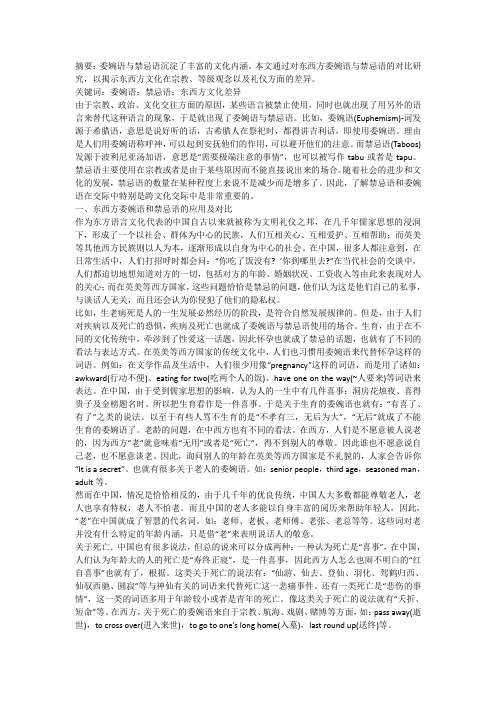
摘要:委婉语与禁忌语沉淀了丰富的文化内涵。
本文通过对东西方委婉语与禁忌语的对比研究,以揭示东西方文化在宗教、等级观念以及礼仪方面的差异。
关键词:委婉语;禁忌语;东西方文化差异由于宗教、政治、文化交往方面的原因,某些语言被禁止使用,同时也就出现了用另外的语言来替代这种语言的现象,于是就出现了委婉语与禁忌语。
比如,委婉语(Euphemism)-词发源于希腊语,意思是说好听的话,古希腊人在祭祀时,都得讲吉利话,即使用委婉语。
理由是人们用委婉语称呼神,可以起到安抚他们的作用,可以避开他们的注意。
而禁忌语(Taboos)发源于波利尼亚汤加语,意思是“需要极端注意的事情”,也可以被写作tabu或者是tapu。
禁忌语主要使用在宗教或者是由于某些原因而不能直接说出来的场合。
随着社会的进步和文化的发展,禁忌语的数量在某种程度上来说不是减少而是增多了。
因此,了解禁忌语和委婉语在交际中特别是跨文化交际中是非常重要的。
一、东西方委婉语和禁忌语的应用及对比作为东方语言文化代表的中国自古以来就被称为文明礼仪之邦,在几千年儒家思想的浸润下,形成了一个以社会、群体为中心的民族,人们互相关心、互相爱护、互相帮助;而英美等其他西方民族则以人为本,逐渐形成以自身为中心的社会。
在中国,很多人都注意到,在日常生活中,人们打招呼时都会问:“你吃了饭没有? ‘你到哪里去?”在当代社会的交谈中,人们都迫切地想知道对方的一切,包括对方的年龄、婚姻状况、工资收入等由此来表现对人的关心;而在英美等西方国家,这些问题恰恰是禁忌的问题,他们认为这是他们自己的私事,与谈话人无关,而且还会认为你侵犯了他们的隐私权。
比如,生老病死是人的一生发展必然经历的阶段,是符合自然发展规律的。
但是,由于人们对疾病以及死亡的恐惧,疾病及死亡也就成了委婉语与禁忌语使用的场合。
生育,由于在不同的文化传统中,牵涉到了性爱这一话题,因此怀孕也就成了禁忌的话题,也就有了不同的看法与表达方式。
中西委婉语透视不同的社会文化

中西委婉语透视不同的社会文化本文从文化的角度浅析中西委婉语的差异,通过分析汉语委婉语和西方英语国家委婉语在功能、话题以及应答方面的特点,从而更好促进交流。
标签:委婉语;差异;言语行为;文化因素语言是人与人之间沟通的重要工具,是人类文明发展的重要特征。
所谓“委婉语”就是用更加委婉、迂回、间接、柔和的沟通词语或交流方式,把原本直接、粗俗、尴尬的内容重新呈现给听者,让对方更易接受。
在此,由于不同的民族文化,不同的社会背景,委婉语在其内容、功能等方面也会呈现出不一样的地方。
这就需要我们对于各国、各民族的社会发展和文化习俗有一定的了解。
否则在跨文化交际过程中,会出现沟通不顺畅、效果不佳的情况。
本文将从委婉语的起源、定义、功能以及通过中西委婉语的差异浅析中西文化差异。
一、委婉语介绍委婉语是语言表达的一种重要形式,存在于不同的文化载体中。
此种表达方式和沟通技巧让交际变得更加畅通,更好的维系并促进了社会的各种关系。
所谓委婉语,是一种更加温婉及间接的表达言语,它的出现和存在,主要是替代让人感到不快的沟通词或短语,最终可以通过此种语言艺术传递某种隐晦信息,达到期望的沟通效果。
委婉语,是社会文化发展的产物,一种普遍的文化现象,不同的民族,不同的社会背景,孕育着不一样的语言表达方式。
以下将从委婉语的发展起源、定义、社会功能以及遵循的原则出发来进行总体介绍。
(一)委婉语的产生和定义委婉语开始产生最主要的原因是避讳心理。
有些不好的事情人们尽量避免去直接提及,如对年老、疾病和死亡的相关词句,但为了沟通顺畅,不得不谈及、指明的时候,就必须用较为迂回的词语来替代本想直接表达的话语。
这也就是说,我们在选择回避的同时,会自然而然的找出另外一种来替代。
于是,委婉语就这样产生了。
英文委婉语“Euphemism”此词出自希腊语,“Eu”是“好,很好”的意思,“phemism”是“言语”的意思,所以整个词,我们可以理解为“悦耳的话语”。
早在18世纪80年代初,英国作家Gorge Blunt 就已经在英语中首次引用了“euphemism”一词,并给出了以下定义:Euphemism is a good of favorable interpretation of a bad word. 译为:委婉语是对不好的言语最好的一种释义。
从禁忌语与委婉语看中西文化差异【文献综述】

文献综述英语从禁忌语与委婉语看中西文化差异一、前言部分(说明写作的目的,介绍有关概念,扼要说明有关主题争论焦点)语言是社会发展的产物,同时也就反映了社会生活,随着历史的进步的发展,语言也发生了很多的变化。
由于宗教、迷信、礼仪以及科技不发达的原因,某些语言就被禁止使用,同是也就出现了用另外的语言来替代这种语言的现象,于是就出现了委婉语与禁忌语。
在不同的民族和文化中都存在着委婉语与禁忌语,如果我们掌握了他们,就能够在日常生活特别是在跨文化交际中,提高我们的交际能力。
二、主题部分(阐明有关主题的历史背景、现状和发展方向,以及对这些问题的评述)委婉语(委婉语)一词源于希腊文,这意味着好,因此,在牺牲时,古希腊人说幸运,这将使用委婉语。
原因是人们使用委婉称之为上帝,可以发挥他们的作用,以安抚,以避免他们得到的重视。
古代人不理解大自然的力量和技术发展得如此崇拜更清晰,委婉的说法是宗教的起源。
古希腊文化的传播到欧洲和美国与时代的发展和变化,在语言的发展变化,内容和范围的委婉发生了很大变化,在敏感话题的人际沟通使用隐含禁忌,迂回,曲折,委婉的语言来表达,少人进攻的话,用哀婉的词来表达涉及到人们的隐私。
委婉语也将成为参与广泛,不仅涉及到鬼,人类疾病和死亡,以及其他方面,而且对经济,政治,文化,教育,战争等领域。
因此,委婉语的使用,以满足人们对通信的需求,而是来自社会各方面也反映了一个民族礼仪,社会制度和文化传统。
禁忌(禁忌)起源Boliniya汤加,意思是“极端的事情,需要注意”也被写入禁忌或塔普。
18世纪,英国水手JamesCook首先注意到汤加禁忌做法,并把这个英文单词,根据牛津高级英汉汉英双语词典,禁忌词的含义“(incertain文化)禁止或一些被视为禁止因为不这样做,感动,用forreligious或其他原因“。
从这个角度看,在宗教禁忌语的主要用途,或由于某种原因不能直接告诉留念。
随着社会的进步和发展,在一定程度上的禁忌字数,而不是更少而是增加了。
- 1、下载文档前请自行甄别文档内容的完整性,平台不提供额外的编辑、内容补充、找答案等附加服务。
- 2、"仅部分预览"的文档,不可在线预览部分如存在完整性等问题,可反馈申请退款(可完整预览的文档不适用该条件!)。
- 3、如文档侵犯您的权益,请联系客服反馈,我们会尽快为您处理(人工客服工作时间:9:00-18:30)。
中西委婉语透视不同的社会文化
本文从文化的角度浅析中西委婉语的差异,通过分析汉语委婉语和西方英语国家委婉语在功能、话题以及应答方面的特点,从而更好促进交流。
标签:委婉语;差异;言语行为;文化因素
语言是人与人之间沟通的重要工具,是人类文明发展的重要特征。
所谓“委婉语”就是用更加委婉、迂回、间接、柔和的沟通词语或交流方式,把原本直接、粗俗、尴尬的内容重新呈现给听者,让对方更易接受。
在此,由于不同的民族文化,不同的社会背景,委婉语在其内容、功能等方面也会呈现出不一样的地方。
这就需要我们对于各国、各民族的社会发展和文化习俗有一定的了解。
否则在跨文化交际过程中,会出现沟通不顺畅、效果不佳的情况。
本文将从委婉语的起源、定义、功能以及通过中西委婉语的差异浅析中西文化差异。
一、委婉语介绍
委婉语是语言表达的一种重要形式,存在于不同的文化载体中。
此种表达方式和沟通技巧让交际变得更加畅通,更好的维系并促进了社会的各种关系。
所谓委婉语,是一种更加温婉及间接的表达言语,它的出现和存在,主要是替代让人感到不快的沟通词或短语,最终可以通过此种语言艺术传递某种隐晦信息,达到期望的沟通效果。
委婉语,是社会文化发展的产物,一种普遍的文化现象,不同的民族,不同的社会背景,孕育着不一样的语言表达方式。
以下将从委婉语的发展起源、定义、社会功能以及遵循的原则出发来进行总体介绍。
(一)委婉语的产生和定义
委婉语开始产生最主要的原因是避讳心理。
有些不好的事情人们尽量避免去直接提及,如对年老、疾病和死亡的相关词句,但为了沟通顺畅,不得不谈及、指明的时候,就必须用较为迂回的词语来替代本想直接表达的话语。
这也就是说,我们在选择回避的同时,会自然而然的找出另外一种来替代。
于是,委婉语就这样产生了。
英文委婉语“Euphemism”此词出自希腊语,“Eu”是“好,很好”的意思,“phemism”是“言语”的意思,所以整个词,我们可以理解为“悦耳的话语”。
早在18世纪80年代初,英国作家Gorge Blunt 就已经在英语中首次引用了“euphemism”一词,并给出了以下定义:Euphemism is a good of favorable interpretation of a bad word. 译为:委婉语是对不好的言语最好的一种释义。
《牛津高阶英汉双解词典》中对于委婉语是这样解释的:“use of pleasant,mild of ind irect words or phrases in place of more accurate or direct ones.”翻译过来也就是:“用愉快的,温婉的、间接的语句来替代更为精准或直接的表达。
”上海金融学院外语系邵军航的《委婉语的定义》(2008)中这样定义:作为一种语言或言语现象,委婉语应有其表达或描述的对象;作为某些表达的替代,委婉语应有其被选择的原因或动机;作为一类语言或言语现象,委婉语应有区别于其他范畴的特点及表达的手段或方式。
由此可见,委婉语广泛存在于人们的交流言语之中,是极
其重要和巧妙的语用策略,用一种温和、婉转、间接、抽象、礼貌的方式,将原本直接、冒昧、禁忌、不雅的语言柔化、含蓄的表达出来,避免了沟通不愉快和尴尬,从而达到理想的交际效果。
(二)委婉语的社会功能
1.避讳功能。
在日常交流过程中,人们对于某类现象或客观情况不愿言,或心生恐惧,不敢直言,但是不得去提及的时候,我们会选择使用委婉语来完成这类沟通。
比如对于“老”这个词。
在西方,人们不愿承认自己迈入老年,因为他们认为老是反应迟钝、思想僵化、跟不上时代的体现,因此非常忌讳这个话题,从而创造了很多委婉语来替代,比如golden ager、second childhood、sunset year、getting on years等等。
对于“死亡”,每个国家,每个民族都有各自的说法,是共性,因为“死”被认为是一种灾难、是大不幸、是超过人力控制范围,我们每个人都无法也不愿去面对,但又不能做到完全避开不谈的一种现象。
在英语国家,表达“死亡”的委婉用词非常丰富,人们常常用to pass away,to depart,to leave us,to pay one’s debt to nature,happy release,to go to heaven等等代替die这个词。
在中国,人们更愿意称“死亡”为“归天”,因为中国的佛教中认为死亡可以达到西方极乐世界。
孔子时代的儒家观点就认为,人的自然生命可以终结,但是其精神和道德将永久留存于人世间。
2.礼貌功能。
在我们日常沟通中,时刻得考虑到在交际过程中避免直面冲突或冒昧。
礼貌原则是委婉语的一个重要原则,也是我们在交流中必须重视的一个原则,同时是语用学中极为重要的内容。
在不得已的情况下,我们需要选择用委婉语来软化我们的态度,缓解矛盾,协调气氛,更含蓄得体的將我们的想法表达出来,传递给对方。
这样不仅遵循了沟通的礼貌原则,同时又很好的考虑照顾到对方的感受,使双方的交谈以及情感维系更进一步。
比如对于肥胖一词,英语国家通常用big,fluffy,heavy-set,extra large等词。
3.褒扬功能。
委婉语可以起到褒扬的作用。
我们可以用中性词或褒义词来替代一些具有贬义色彩的词语。
(三)委婉语的表达要求
1.遵循事实,表达得体。
虽然委婉语是通过较为隐晦、迂回婉转,更为曲折的的方式来表自己的思想,但仍然还是需要遵循一些原则,恰到好处的委婉用语,才会经常受到意想不到的效果。
太含糊、过于掩饰的话也会起到相反的作用,会让对方认为说话者在欺骗或掩饰不好的地方。
所以在表达的同时,需要建立在可观事实的基础上,稍加修饰、礼貌用语即可。
2.注意说话对象、时间和场合。
在不同的场合、面对不同的人,我们使用什么类型的委婉语,都是需要注意的,否则会带来误会和尴尬。
二. 中西委婉语差异透视中西文化的差异
(一)中西等级观念的差异
在西方,大家倾向人人平等原则,在称呼比自己大的长辈的时候,大多喜欢直呼其名。
在家里,在给晚辈命名的时候,更是喜欢用父母辈或是祖父母辈的姓名来命名,这不是对长辈的不敬,相反,是出于对长辈的尊敬和怀念。
在西方职场中,大家也是喜欢对自己的领导称呼其名,大多数情况下,不管职位大小之分。
而在中国,受历史文化影响,我们对自己的长辈,出于尊敬,都不会直呼其名,对于上級,更是用职称语言来替代名字,所以就出现类似“老板、老总、总监、经理”等词,常常挂在嘴边。
在这类词的前面,加上姓氏,成为我们平日工作的称呼语。
再者,追溯至中国古代历史,封建社会,人们更加注重等级之分,比如在平日言语中,需要避开皇帝本人的姓名、或是和其姓名相同的字音,在家中,需要避开祖辈的名字,以此来表示尊敬。
这和西方的文化有很大差别。
(二)中西方价值观的差异
自古以来,中国就是一个礼仪之邦,讲究礼节、讲究谦让,受儒家思想的影响,人们更希望社会的和谐,人际关系的和谐,在说话或行动方面,大多都以谦虚、敬重对方的方式展开社会交往。
比如“贵公司、贵姓、高见、哪里”等词经常出现在我们的话语中,听者会感到一种被尊重的感觉,从而会很乐意地继续交流下去。
再举个例子,当谈到“老”这个字的时候,我们一般会认为称呼语前面加“老”,会体现出对方阅历、经验等各方面都很丰富,显成熟的表现,另外同时也可以表明说话者对被说话者的一种尊重,例如“老张、老院长”等。
但在西方,大家普遍的价值观是以个人为中心,突出个人的价值观,强调自身的发展,他们非常重视个人隐私,包括年龄、收入、家庭、宗教信仰等,所以自然而然的,对于“老”这个字,西方人一般不愿被提及,也不愿意听到对方称自己年老。
进而创造出关于“老”的很多委婉语,来替代这个字或相关词语,起到回避的作用。
三、结语
作为语言的重要组成部分,委婉语已经时刻存在于人们日常的沟通交流中,无法脱离。
一旦没有委婉语的存在,那我们的交际世界将变的可怕,更多直接,或冒昧,或不雅的词语和句子将会充斥人们的对话,最后会影响或直接导致沟通的失败。
而在交流过程中,文化壁垒在目标语言和源语言之间,总是难以逾越。
作为语言学习者和研究者,我们需要理解语言应用背后的文化深邃、民族价值观、民族特性等。
当我们了解委婉语的使用初衷、含义的差别,并掌握其语用环境,就会在跨文化交际过程中减少或避免此类词语的使用失误,避免双方尴尬,达到沟通的预期效果。
【参考文献】
[1]周丽娜.美语新词语与当代美国文化研究[M].中国社会科学出版社,2015.
[2]游汝杰,邹嘉彦.社会语言学教程[M].复旦大学出版社,2016.。
